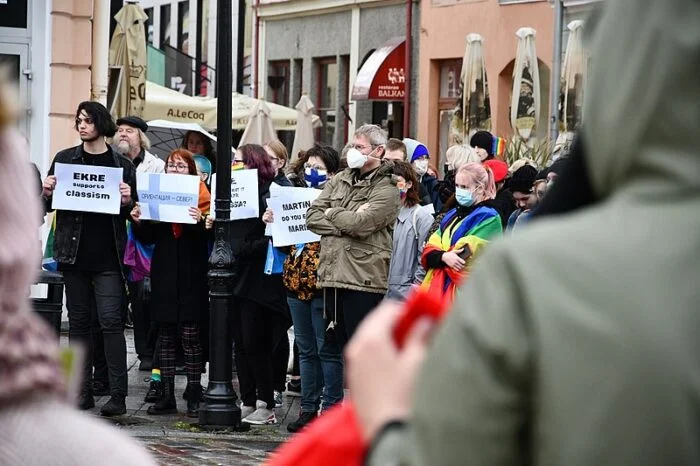Estonian municipal elections 2021: EKRE increases its popularity

At the municipal elections held in Estonia between October 11th and 17th, the right-wing populist Conservative People’s Party (EKRE) doubled its vote share to 13.2 from 6.7 percent in the elections of 2017. Meanwhile, both Reformierakond (Reform Party – centre-right) and Eesti Keskerakond (Centre Party – nominally centrist) suffered losses. The former party garnered a mere 17.3 percent of the ballot, whereas the latter, despite winning 24.4 percent and securing the top spot, lost its ‘traditional’ stronghold of Narva in the north east (Ida-Virumaa county). Moreover, the Centre Party failed to win an absolute majority in the capital city of Tallinn for the first time in more than 15 years. However, the party which suffered the greatest losses was the (centre-left) Social Democrats/SDE, garnering a mere 5 percent of the vote in comparison to the 10.4 percent that it won in 2017. What were the deeper reasons behind EKRE’s successful performance? How did the party capitalize on the losses of its contenders?
Against ‘Tallinn based’ politics
EKRE’s systematic opposition to immigration has been one of the major catalysts to account for the improvement in the party’s public appeal since 2015. Nevertheless, the period between 2018 and 2021 did not see a drastic increase in the number of migrants and/or refugees in Estonia. Correspondingly, the party’s policymakers started putting greater emphasis on anti-corruption rhetoric and anti-establishment politics. As highlighted in EKRE’s programmatic documents, of crucial significance for the party it is to shine the spotlight on politicians and parties which are ‘harmful or dangerous to the state’; and to set up a special committee in the Riigikogu (national parliament) tasked supervising the courts and prosecutor’s office. At the same time, EKRE’s leadership perceives institutions such as the media to be part of the ‘corrupt establishment’. Especially during its term in the coalition government with the Centre Party and (conservative) Isamaa/’Fatherland’ (April 2019-January 2021), EKRE actively called for the removal of journalists with viewpoints ‘unfavourable to the Estonian people’ – both from the state media (e.g. the Estonian National Broadcasting Service/ERR) and the press (e.g. Postimees, Estonia’s oldest newspaper).
EKRE’s convincing endeavour to pose as a genuinely anti-establishment party that ‘stands for the average Estonian’, from outside as well as from within the governing structures, is the major catalyst to account for its successful performance in the municipal elections. Both on the basis of programmatic standpoints and active policymaking, EKRE appears to have struck a chord with those segments of the electorate that perceive themselves as excluded from the ‘big’ establishment. On the one hand, these target groups express disbelief at the ‘Tallinn-based’ politics at the Riigikogu level and have also been negatively affected by the neoliberal economic policies espoused by Reformierakond (hence the appeal of the family and child benefits endorsed by EKRE). On the other hand, the same pockets of voters remain suspicious of the ‘externally imposed’ politics of multiculturalism and political correctness. It is precisely at this point that one might hint at the declining popularity of the Social Democrats, a party that has been repeatedly accused of ‘relentlessly promoting multicultural policies’ by EKRE. The same thing might be argued about the newcomers of (centrist/neoliberal) Eesti 200/’Estonia 200’ who, despite their ambitious entry with 6 percent of the vote, mostly exerted an appeal on the urban voters of Tallinn, Tartu, and Narva.
Still appealing to rural voters
Since the parliamentary elections of 2015, EKRE has succeeded in establishing a stronghold in the rural constituencies of the west (namely, the coastal area of Pärnumaa) as well as the south (with the exception of Tartu). In these elections, this pattern persisted and EKRE took the town hall in Pärnu. Apart from its anti-establishment platform against ‘Tallinn-based’ politics, the party has been projecting a campaign of eco-nationalism, if not ‘ecological Euroscepticism’. In particular, EKRE has long been opposing the Rail Baltica project. This is a large, EU-funded, infrastructural project with the aim to connect the Baltic States with Central Europe via railway. EKRE has been contending that Rail Baltica is hazardous to the natural environment as well as to Estonia’s rural communities. In addition to this, EKRE has been sponsoring a protectionist agenda which consists in the introduction of measures for the prioritization of Estonian agricultural produce in the national market. It is this more direct engagement in favour of the Estonian farmers which has additionally enabled EKRE to maximise its appeal in the rural constituencies of western and southern Estonia. This also became obvious in the latest municipal elections.
Still unpopular with ethnic Russians
Here, it should be added that, prior to the elections, EKRE had endeavoured to approach the ethnic Russian voters, in the northeast and elsewhere, in a more coordinated manner. Attention was paid to symptoms of economic malfunction, the alleged marginalization of Ida-Virumaa by the ‘Tallinn-based’ establishment, and a set of socially conservative values which EKRE is said to share with the bulk of Estonia’s ethnic Russian community. Nevertheless, EKRE’s unsuccessful performance in Narva (below the threshold of 5 percent) hints that the party’s highly (Estonian) ethnocentric agenda still puts off ethnic Russians from voting for it. Lastly, the declining appeal of the Centre Party among ethnic Russians might confirm several allegations that party leader, Jüri Ratas, had assumed a rather passive stance towards EKRE during his term in office as Estonian PM (April 2019 – January 2021).
The author is a researcher on the POPREBEL project. This project has received funding from the European Union’s Horizon 2020 research and innovation programme under grant agreement No 822682.
